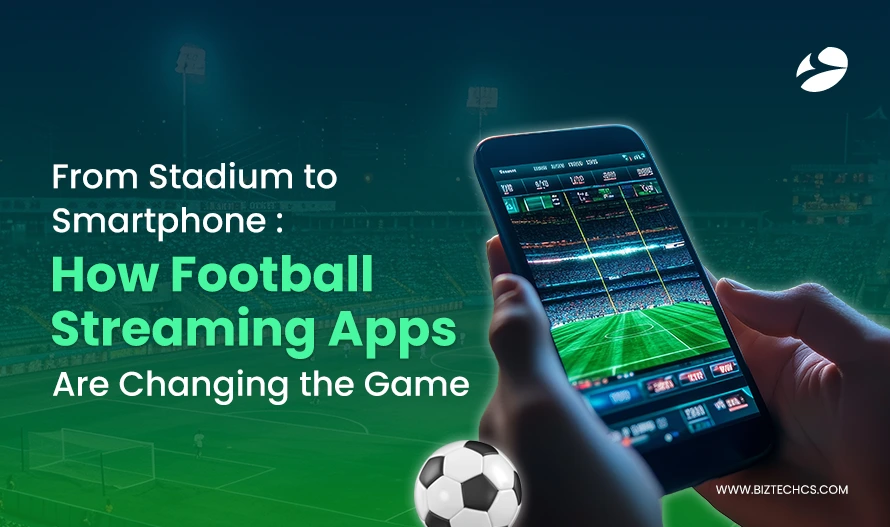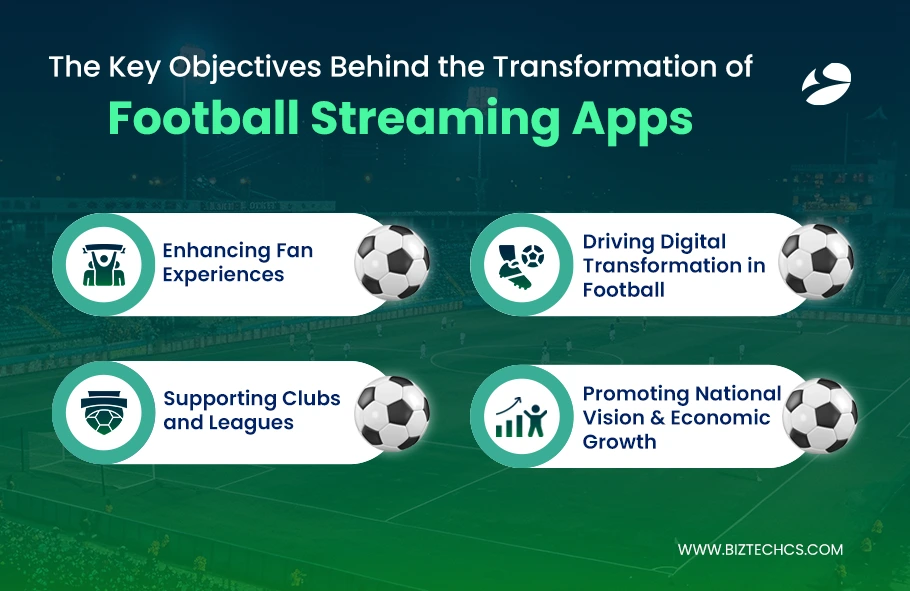From Stadium to Smartphone: How Football Streaming Apps Are Changing the Game?
28 Apr, 2025
10 min read
28 Apr, 2025
10 min read
Table Of Content

Unique among sports, soccer is both convincing and appealing to people, but it is also fast-changing, along with its fans. Streaming applications are the new order features in the transformation of seeing, talking, discussing, and enjoying soccer games.
With these developments, fans no longer need to be in a stadium to enjoy the games thrillingly from their own place. This is now made possible by digital innovations, allowing anyone to view live broadcasts on their smartphones at any time and from anywhere.
Digitization opens up new possibilities, not only for people’s access to football but also for new modalities in which they can interact with it. For instance, such applications utilize gamification, blockchain technology, and AI app development, enhancing the overall fan experience.
According to Statista, the global sports streaming market is projected to reach approximately $87 billion by 2026, expanding at a compound annual growth rate (CAGR) of 15% from 2021 to 2026. Such burgeoning trends make it clear just how much the digital landscape influences the way football is consumed.
The past, when one needed to be glued to the television to catch a matc,h is gone. No,w with the coming widespread use of smartphones, it could not be easier. Fans no longer need to pay and be tied down by a traditional cable subscription.
All they require to keep the thrill alive is a football live streaming app, and off they go with their favorite teams, anywhere, anytime.
The main point here is that this is all part of the global digital transformation in football, and technology plays a key role in bringing the sport closer to fans.
AI in football apps personalizes, from the content-tuning process to the best viewing angles. Some are even experimenting with a football app that integrates NFTs, which will open up new engagement avenues for fans.
These applications have transformed everything, from just a simple viewership tool to an experience entirely based on a fan under the new paradigm. Minutes before, a person could passively observe football on a single screen, live games.
Now, all these applications open up the facility for the user to track every pass, shot, and goal as they happen through its real-time statistics, even giving the user control over choosing camera angles to view the action and every single event inside the match.
Become the first person to enjoy exclusive content gained through locker room footage and post-match interviews. Having poles as part of this interactive structure and predictions will make for an enjoyable viewing experience and establish engagement between fans and sports collusive action.
Of course, there is now an argument that the football gamification platforms and further football blockchain applications are redefining new frontiers at the interface between fans and their sport.
In a rapidly growing market, it becomes clear that football live streaming applications are forging a new identity for fans in this digital age.
It is a little late to chat about the need to rush back home to catch a much-awaited football match in front of the TV.
With increasingly sophisticated mobile technologies, the viewing power has now rightfully shifted to viewers, allowing them to watch matches live on their own terms.
Football live streaming apps have changed how people follow sports now more flexible and easier than ever. Apps like these allow fans to watch games virtually anytime and from anywhere, without being chains to television sets.
The digital transformation in football now pushes the boundaries even further, allowing AI algorithms to personalize content and improve the overall experience.
Additionally, some football apps have integrated superb features, such as NFT integration, to give fans new ways to engage with their teams.

This is nothing short of transforming how fans experience football. Instant access to live games becomes available on these platforms, allowing fans to watch matches anywhere.
Real-time statistics and multi-camera angles have made the fan experience considerably richer and more immersive.
With customized notifications and on-demand highlights, fans are assured of not missing a moment, even when they want to catch up on things.
Live football streaming applications have brought about a digital transformation to the sport of football as a whole. These applications utilize advanced technologies, including AI and machine learning, to deliver personalized content and enhance user engagement.
Smart recommendations, data-driven insights, and similar features have revolutionized the way fans interact with football. All this digitization works toward paving the way for greater connectedness and technological advancements in the future of football.
Football streaming apps help not just fans, though. These apps provide a whole new kind of benefit for clubs and leagues through a direct revenue stream, with subscriptions and advertisements being broadcast live in this manner.
They open up the club to a truly global audience, outside of just getting fans into a stadium. This is now especially important for the much smaller clubs and leagues that are trying to expand their footprint and become economically sustainable.
Providing access to football has a significant impact on national vision and economic growth. It makes football tourism, sponsorships, and local businesses thrive. These applications provide governments and organizations with opportunities to market sports as an integral part of cultural identity.
As the sport becomes more popular and perks associated with it grow, new jobs are created, and new innovations emerge in the media and technology sectors.
Football streaming apps are applying gamification features to enhance fan engagement and loyalty programs. These programs reward users for watching matches, interacting with content, and participating in challenges through points.
Fans redeem those points for exclusive content, merchandise, or even tickets to live games. Gamification makes these apps a far more immersive and rewarding experience for fans.
This process fosters a lasting relationship between fans and their favorite teams and brands, cultivating loyalty while maintaining a generous amount of entertainment.
Integrating NFTs has granted football streaming apps new dynamics for interaction for their fans with their respective teams. With the help of the in-app marketplace, fans can buy, sell, and trade these digital collectibles.
Consequently, these new revenue-generating avenues for clubs present an opportunity for classically rare memorabilia gifts for these fans to own.
On another occasion, the introduction of auction channels enables bidding on limited-price items that convey a sense of exclusivity.
By juxtaposing sports with blockchain technology, football apps not only stream matches but also design an entire digital ecosystem for fans to thrive on.
Live streaming is undoubtedly the quintessential feature of football apps, with a technology upgrade now giving way to real-time wayfinding in stadiums. Apps also offer live game broadcasts with interactive stadium maps, helping fans to navigate large venues with aplomb.
This feature greatly benefits live-event attendees by guiding them to their seats, amenities, or merchandise stalls in real-time.
Updates on the game’s status and live scores also serve viewers, whether they are in the stadium or watching at home. With these upgrades, the football streaming apps are improving the overall fan experience both online and offline.
Football streaming apps are leveraging AI to deliver personalized content tailored to individual fans. The AI algorithm recommends games, highlights, and team news according to a user’s personal viewing habits and preferences.
With the further integration of AirGPT chatbots, users will be able to find answers to their queries instantly. Whether it’s about game schedules, player stats, or ticket availability, fans get immediate, accurate answers.
These AI features enhance user satisfaction and facilitate a more seamless and interactive experience for fans.
The streaming industry is beset with numerous challenges. The primary of such challenges relates to copyright. Obtaining the rights to display something in a particular location can sometimes be a strenuous, costly, and complex process.
Copyright regulations often prevent fans from enjoying certain games or broadcasts, further frustrating them. Piracy still remains a headache, as unauthorized streaming websites operate alongside legitimate ones.
Another challenge would be the regional licensing regulations, which vary much among the myriad of different markets. For football streaming platforms, these rules hinder their ability to provide equal coverage of matches to fans in different regions, thereby restricting access to crucial games.
In some countries, fans may find it challenging to watch certain significant football matches due to this legal backdrop. These very complicated legal backdrops also often become things that delay, if not actually obstruct, broadcasters from showing a live game on air, an act that consequently leaves some football fans with limited viewing options.
Therefore, football streaming websites must navigate their way through these complex regulations to expand their reach and satisfy a global audience.
The issue of bandwidth is also an impediment to the progress of football streaming platforms. Hence, good internet connections are necessary for high-quality video streams to provide the ambiance of watching football.
In places where infrastructure is weak, slow internet speeds or network congestion can cause buffering, poor video quality, and a torturous experience for fans streaming a live match.
This becomes more pronounced in emerging markets, where internet access is developing, and fans may struggle to access football in HD or without interruptions.
Despite these problems, there are numerous opportunities waiting to be exploited in emerging markets. By its app-based model, the football streaming app offers a unique proposition for personalized viewing experiences that are not typically afforded by traditional TV.
These platforms can individualize football content, advertisements, and promotions in a manner that directly engages the fans. This versatility in user engagement enables football streaming platforms to cater to diverse fan bases, thereby propelling their growth and transforming the way football is served worldwide.
Football streaming apps are redefining fan engagement, changing the way matches are viewed and felt. Well, move from traditional TV viewing to mobile viewing: easing a burden? A complete metamorphosis.
This is the best time to enjoy football as these apps provide personalized experiences with technologies such as AI and AR. Additionally, this has been made possible through the further integration of blockchain technology into the ways fans interact with their teams, adding another layer of value.
The clubs and leagues are now able to harness these platforms to reach a global audience and find new revenue streams. Apart from challenges such as regional licensing or bandwidth restrictions, it appears to be a promising future for football streaming apps, as emerging markets offer significant growth opportunities.
As the digital transformation continues, these apps would redefine fans’ nexus with football.

Artificial Intelligence (AI)
2273
By Devik Gondaliya
25 Apr, 2025

Artificial Intelligence (AI)
8564
By Devik Gondaliya
22 Apr, 2025

Storyblok
42297
By Devik Gondaliya
02 Apr, 2025